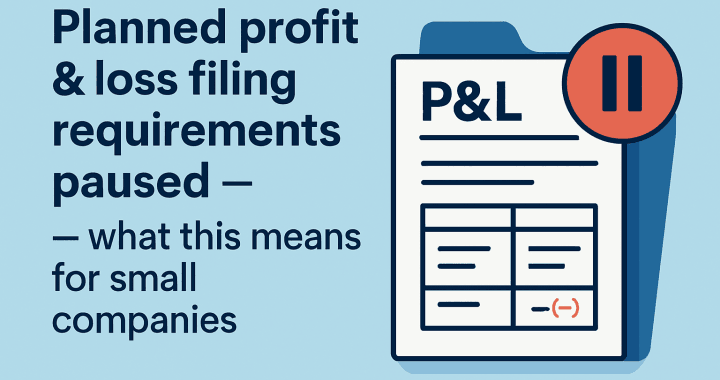
The UK government has paused the upcoming requirement for small and micro-entities to file a detailed profit and loss account (P&L) at Companies House, which was originally due to take effect from April 2027 under the Economic Crime and Corporate Transparency Act.
Here’s what’s happened, why it matters, and what you should do now.
Background – what was planned?
Under the planned reforms:
- Small companies (turnover under £10.2 m, balance sheet under £5.1 m, fewer than 50 employees) would no longer be allowed to file abridged or filleted accounts.
- Instead, they would have had to file a full profit and loss account and a directors’ report with Companies House.
- These accounts would have become publicly available, increasing transparency but also removing a key privacy advantage currently available to small entities.
Why has this been paused?
From a professional perspective, there are several reasons:
- Regulatory burden – For many small businesses, preparing fully detailed P&L accounts suitable for publication would have added cost and complexity.
- Commercial sensitivity – Businesses were rightly concerned about having sensitive turnover and margin data visible to competitors, suppliers and customers.
- Disproportionate impact – While the aim was to reduce economic crime, it risked penalising compliant businesses rather than deterring fraudulent ones.
- Government policy shift – The new administration has pledged to reduce regulatory costs for businesses by 25%, and pausing this measure aligns with that wider
What this means for your accounts
- For now, small and micro-entities can continue to prepare and file abridged or filleted accounts, without publicly disclosing a full profit and loss statement.
- The requirement to file in software-only format (iXBRL) for all entities has also been put on hold.
- Other Companies House reforms – such as mandatory identity verification for directors and persons with significant control (from autumn 2025) – are still going ahead.
What we recommend
- Stay prepared – The government may revisit these changes in the future. Keep your bookkeeping and accounting records complete and up to date so that preparing a detailed P&L isn’t an obstacle if rules change later.
- Talk to us – We can advise on the pros and cons of voluntarily filing more detailed accounts (for example, where it may help with credit rating) vs. keeping filings minimal.
- Watch upcoming deadlines – The ID verification requirements and changes to corporate registers are still progressing on schedule.
In summary
The decision to pause compulsory P&L disclosure removes an immediate compliance risk and cost for small businesses, while preserving commercial confidentiality.
As accountants, we welcome this move as a sensible balance between transparency and practicality, and we will keep clients updated if the position changes.